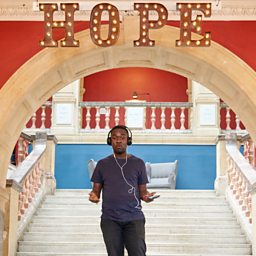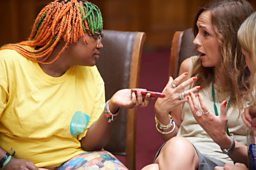Home and Safety: what the covid-19 pandemic reminds us about a life in care
Dr Sylvan Baker

My name is Dr Sylvan Baker. I am 54, a care leaver and an academic - not words you often hear in the same sentence. Six years ago, I was at a university in London listening to a young woman talk about her experiences of being in care. Let’s call her Leah. She was 14, and white; I was 48, and am not. Leah was often ignored; as an academic, I’m heard a lot. She’d been in care since 2008, I left the UK care system over 20 years before she was born.
I am 54, a care leaver and an academic - not words you often hear in the same sentence.
This is what she said:
‘I’ve literally become a catalogue of irrelevant facts and info. And it’s dehumanising, to be honest. If adults don’t really view you as a human, then how can you view yourself? Kids have become just another number, another statistic and it’s not whether a child is being cared for; its whether they’re being dealt with and that’s not the same. Every child deserves the unconditional love of a family and warmth of a loving home - not a house, a home …’
These were Leah’s young thoughts, word-for-word, verbatim.

Hearing Leah’s words does something; they share emotion. She invites you to consider how she feels, what care is like for her. She speaks a language that may be more complicated than her years, but it’s a language we both speak and one that needs to be shared and, perhaps, to be better understood.
At present in the UK, there are over 83,000 children in care.
At present in the UK, there are over 83,000 children in care.
Since listening to Leah in 2015, I and others have invited social workers, foster carers and more to listen to her, and to the many other young people with experience of care. I have drawn on my own time in care and have asked young people in - or leaving - care now to do the same. We invite young people with direct experience of what that system does, not to be the subject of the research, but to help to try and make the system better.
Working with me, these young people are co-researchers seeking a change in the system. We call this research ‘The Verbatim Formula’ - sharing words and feelings to transform listening in action.
Social workers have told me that listening to these words affects them differently to just reading reports. It lets them reconsider how they support young people and, hopefully, it inspires change.

Social workers have told me that listening to these words affects them differently to just reading reports. It lets them reconsider how they support young people and, hopefully, it inspires change.
Working on The Verbatim Formula has allowed some care experienced young people to feel connected and has reminded them that there are people who want to listen
Covid 19 has revealed some of the social challenges facing different members of British society. The call offered by the UK government to ‘Stay Safe, Stay Home and Protect the NHS’ can be seen differently for young people in care. What if the place where you have to stay is not your home, and what if social distancing creates not just space but isolation?
Both of these situations are challenges faced by the many young people who find themselves in the UK care system. Young people have told me of the challenging situations created by the pandemic, and how these have only intensified their feelings of disassociation from society.
I entered the UK care system in the 1960s when I was 11 days old and stayed in the system until I was 18. Back then, the challenges facing a looked after child - the legal definition for a young person who finds himself in care – were an ongoing concern. Being a ‘looked after child’ is complicated; the impact of being placed in care can remove all of the support structures that people without an experience of care may take for granted. As Leah said, it can be dehumanising. Support from parents and carers, contact with siblings and friends can all be disrupted or destroyed by the upheavals of care. Working on The Verbatim Formula has allowed some care experienced young people to feel connected and has reminded them that there are people who want to listen.

Today, many of those challenges I faced still persist. The impact of being taken out of a family set up leaves a lasting trace on you. Watching ‘Small Axe’ about Alex Wheatle, it was obvious what the impact of his early life in care did to him and the legacy that it left. Many times in the film he’s asked who he is, what his story is; the tragedy of the situation is that for a long time he simply didn’t know.
In the film, Alex Wheatle can be seen as just another statistic, another young person on the pipeline from care into criminal justice. But this isn鈥檛 always the case.
This dilemma was one of the many reasons that the research around The Verbatim Formula was created. We wanted to know what it’s like to “live with strangers” in the 21st century. Often when talking about care, there is a great deal of attention paid to the negative impact it can create.
In the film, Alex Wheatle can be seen as just another statistic, another young person on the pipeline from care into criminal justice. But this isn’t always the case, and listening to young people in The Verbatim Formula has revealed stories that challenge the stigma. Being in care is definitely part of my identity, but not necessarily the most defining part. And those positive care stories are not often heard. Many people who were in care in the 1960s, as well as those leaving care now, manage to overcome the odds. They overcome the stigma.
And no, care is not like Tracy Beaker! It is complex and chaotic and often fraught with rejection. It taught me to be self-reliant and adaptable, to be a little suspicious, to expect the unexpected. Life taught me to be less cautious and, eventually, more trusting. Being Black and in care and working with other black people who have experienced care has introduced me many brilliant and talented people who continue to use their skills and talents to encourage and support people.
It is support that looked after children need, as isn’t that the essence of care?
Dr Sylvan Baker is a practitioner and researcher working across the fields of applied theatre, socially engaged arts and social justice for the past 30 years. He is a Lecturer in Community Performance Applied Theatre at London’s Royal Central School of Speech and Drama and is The co-founder and co-investigator of The Verbatim Formula, a collaborative participatory arts project that has developed verbatim theatre techniques to share the voices of care-experienced young people, care leavers and adults responsible for their care and education.
-
![]()
Small Axe: The Podcast
Listen now to 'Person With Care Experience' featuring Dr Sylvan Baker

